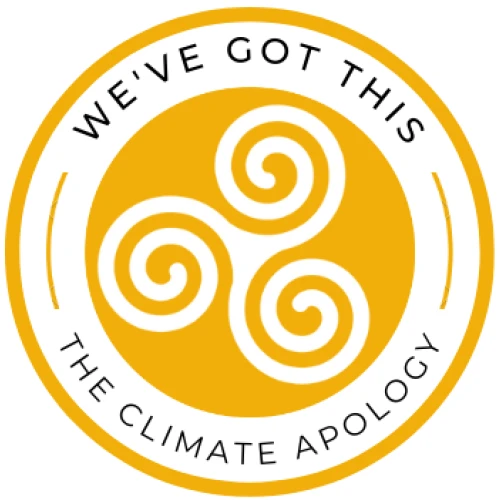It’s great to start talking with people about the idea of an intergenerational climate apology. Not being prescriptive, it is interesting to see how people interpret it differently and find varying degrees of relevance. Two concerns seem to arise pretty quickly: firstly, people are quick to point out that it is often young people who are still jet setting around for quick breaks; and secondly, reducing our consumption will lead to economic collapse.
Both are legitimate issues that need to be discussed – and this is key. What we cannot continue doing is using our questions and concerns as excuses to do nothing about our emissions. Let’s talk about them – extensively, with curiosity and a willingness to find a way forward.
And I believe this is the strength of an intergenerational apology – it is a process that requires us to talk and listen to each other and explore what would be a relevant, effective contribution to climate mitigation within our own particular family dynamic and constellation.
Changing our individual behaviour is not the solution to the climate crisis – that requires a multi-lateral, multi-faceted response from all actors in the public and private sectors. However, if we as individuals don’t change our behaviour, their actions and the potential benefits of technology will be limited. We are all pieces in this complex puzzle and without our contribution the puzzle cannot be solved.
If we listened to all their complaints we’d still be living in a cave
One of the more disconcerting aspects of Switzerland’s 2021 rejection of the proposed C02 laws, which would have aligned Swizterland with its Paris Agreement obligations, was that 58% of those under the age of 34 voted against it.
Us boomers express exasperation and disbelief that, after the whole Fridays for Future movement, young people still want to keep flying on cheap flights. And then we shrug our shoulders and wash our hands off the whole problem.
But we spend our lives as parents and elders encouraging, cajoling and often forcing our kids of all ages to do all kinds of things they don’t want to do – brushing their teeth, eating broccoli, going to school, studying, not smoking, not drinking, calling Grandma – I’m sure you can add a few more.
Why do we suddenly feel so powerless to address this one particular thing they don’t want to do? It may be a matter of strategically choosing the more important battle (according to the most immediate consequences – so tackle homework not climate change). But I think it’s also because it’s a very convenient excuse for us boomers to avoid the difficult task of reducing our own consumption.
And why are we surprised that they still vote for cheap flights? Why are we surprised that they want to do what we have done these last years? Why are we surprised that they behave as consumers when they have been raised in a consumer culture? Why do we expect them to do what we chose not to do for so many years? Why should it be one rule for us and one for them?
‘I’m sorry, but we can no longer fly to Spain for our summer holidays’ is the same ‘sorry’ as ‘I’m sorry, but you have to go to school’. The intergenerational climate apology becomes an expression of sympathy and understanding that what we are asking (telling?!) them to do is annoying, difficult, less convenient and involves depriving them of things that are almost considered a ‘right’ in the global North. It is an expression of sympathy that it’s not fair that they cannot do so freely what we have had the choice to do for decades.
‘Yep, it’s annoying and perhaps unfair – but, we’re going to do it.’ We can’t use our kids’ resistance as an excuse to avoid taking the action that is required of us by science.
Why do I suddenly have to be an economist?
I find the second concern about the economic impacts of changing our behaviour more insidious. It feels like there’s some invisible old guy in a grey suit and a top hat, waving his umbrella at me, admonishing me for being irresponsible and ignorant.
We have to challenge the default position of unlimited growth that is raised threateningly over our heads as if it were some law of nature. It’s the ultimate silencer at a time when we desperately need to explore other ways to exist and co-exist. Even more problematic, it prevents a conversation about the incredible economic risks of continuing with business-as-usual and an uncontrolled response to run-away global warming.
Those guys in their grey suits never expected me to be an economics expert when I fulfilled my role as a consumer these past decades. So why do I suddenly have to be an economics expert to stop consuming?
Let the experts deal with that. There’s enough of them. They’re incredibly clever and have come up with some fascinating models – degrowth, no growth, green growth, doughnut economics, foundational economics. And more.
Sadly, these fascinating and viable theories rarely get an airing in the mainstream because of that silencer guy, paid by the super-rich and powerful to make us nervous of talking about other possibilities to replace our very recent and, in its latest iteration, not very successful form of capitalism (unless you happen to be super-rich and powerful).
Google these models, read about them, explore them, talk about them. Shine some light on them so they can grow and allow both people and the environment to flourish. Add this to the list of steps we can take as individuals to enable our governments to seriously address the climate crisis. And in the meantime, let’s reduce our consumption.

Louise Rapaud
Previous Project
Next Project